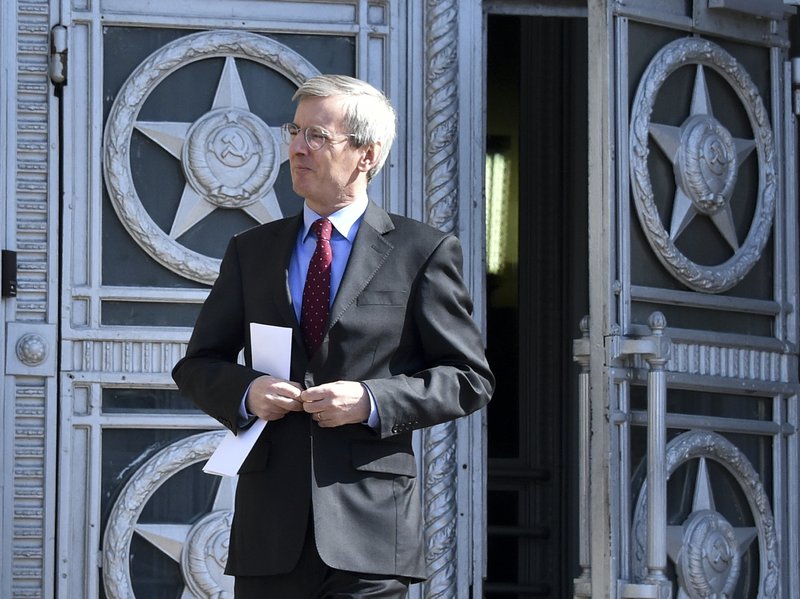Russia ordered new cuts Friday to the number of British envoys in the country, escalating a dispute with the West over the poisoning of an ex-spy in Britain. The massive expulsion of diplomats on both sides has reached a scale unseen even at the height of the Cold War.

Two dozen countries, including the U.S. and many EU nations, and NATO ordered out more than 150 Russian diplomats this week in a show of solidarity with Britain over the poisoning of Russian ex-spy Sergei Skripal and his daughter Yulia that London blamed on Russia.
Moscow has vehemently denied involvement in the March 4 nerve agent attack in the city of Salisbury and announced the expulsion of the same number of diplomats from each nation.
Scores of foreign ambassadors streamed into the Russian Foreign Ministry in Moscow on Friday to receive the notices.
The ministry further escalated its response Friday, saying it has ordered Britain to reduce the number of its diplomats in Moscow to the level that Russia has in London. That exact number wasn’t immediately clear.
WATCH: Why did Canada expel Russian diplomats?

The ministry said it summoned the British ambassador to hand him a protest over the “provocative and unsubstantiated actions by Britain, which instigated the expulsion of Russian diplomats from various nations for no reason.” It gave London one month to reduce its diplomatic personnel in Russia.
When Britain expelled 23 Russian diplomats earlier this month, Russian Ambassador Alexander Yakovenko said it represented a 40 percent cut in the number of embassy personnel.
Commenting on the Russian move, a spokeswoman for the British Foreign Office said: “it’s regrettable but in light of Russia’s previous behavior, we anticipated a response.”
“However, this doesn’t change the facts of the matter: the attempted assassination of two people on British soil, for which there is no alternative conclusion other than that the Russian state was culpable,” she said. “Russia is in flagrant breach of international law and the Chemical Weapons Convention and actions by countries around the world have demonstrated the depth of international concern.”

Get daily National news
A hospital treating the Skripals said Thursday that the daughter, 33, was improving rapidly and was now in stable condition, although her 66-year-old father remained in critical condition.
Speaking to reporters Friday, Kremlin spokesman Dmitry Peskov insisted that “Russia didn’t start any diplomatic wars,” and “remains open for developing good ties.”
WATCH: Russian denials of British attack “increasingly absurd,” Johnson says

He added that Russia has called a meeting of the international chemical weapons watchdog next week to press for an “unbiased and objective investigation.”
Russia has accused Britain of failing to back up its accusations with evidence and refusing to share materials from the probe. The Foreign Ministry said it told the British ambassador on Friday that Moscow is ready to cooperate in the investigation.
The Russian Embassy in London tweeted a statement by the Russian Foreign Ministry’s spokeswoman Maria Zakharova saying that Britain and the U.S. “do most to undermine any trust element in international relations.”
Earlier this week, the Russian Foreign Ministry alleged that British special services could have been involved in the poisoning and claimed that Britain, the U.S., the Czech Republic and Sweden all have researched the class of nerve agent that London said was used to poison Skripal.
Britain and its allies have rejected the Russian nerve agent claims.
On Thursday, the Russian Foreign Ministry summoned the U.S. ambassador to announce the expulsion of 60 U.S. diplomats in a tit-for-tat response to Washington’s move. Scores of Western ambassadors followed suit Friday.
In response to the U.S. move earlier this week to close the Russian Consulate in Seattle, Moscow also shut the U.S. Consulate in St. Petersburg, giving it until Saturday to vacate the premises.
WATCH: Russia expels U.K. diplomats as spy poisoning row intensifies

An Associated Press reporter on Friday saw U.S. consulate staff carrying boxes from the building in St. Petersburg and loading them into a van. Several mini-vans drove out of the consulate while security also detained a man who threw a Starbucks cup at the building.
Some passers-by near the U.S. Consulate in St. Petersburg cheered the expulsions.
“Let them get out of here,” said 61-year-old retiree Viktor Fedin. “You won’t put Russia on its knees.”
Others were more cautious, worried that the closures would affect visa processing for Russians.
“The Russian government has to respond to the hostile actions against Russia,” said 32-year-old researcher Yelena Bogomazova. “But the escalation is bad. The closure of the consulate will make it difficult for people to get U.S. visas. They will have to go to Moscow.”
After Russia expelled several dozen U.S. diplomats, the waiting list for U.S. visa applications in Russia has increased to weeks, if not months, as the U.S. Embassy said it was unable to process visa applications faster because of the staff shortage.
Russia also warned that the expulsions of its diplomats could slow down issuing visas.







Comments
Want to discuss? Please read our Commenting Policy first.